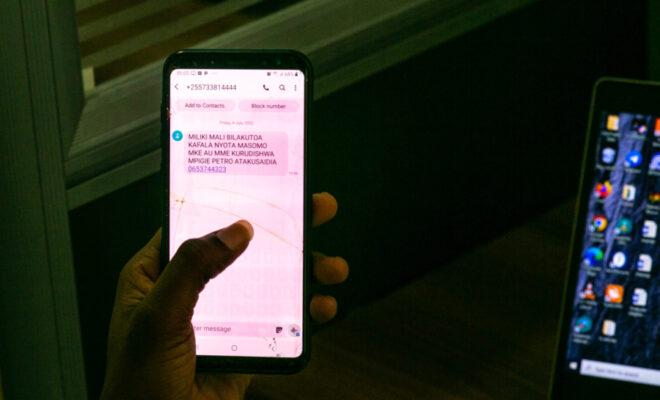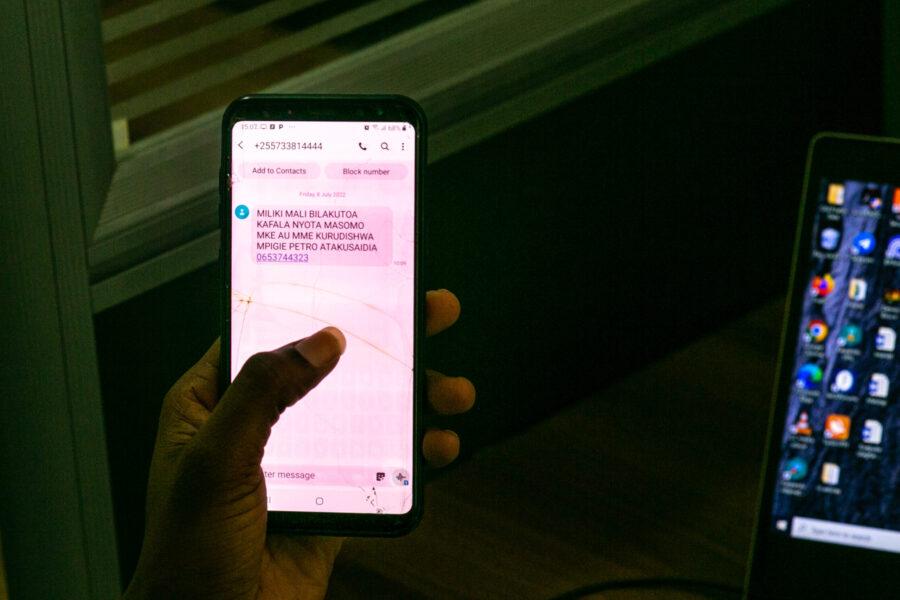“Gone like it was nothing”: The irrepressible rise of mobile scams

Despite Tanzania making SIM card registration mandatory, people still receive daily texts from fraudsters trying to trick them into sending money.

A scam text in Swahili persuading the receiver to contact a ‘witchdoctor’ in order to obtain wealth, academic success, and love attraction. These messages are sometimes accompanied by fabricated testimonies. Credit: Mweha Msemo.
Out of the blue last year, Sauda Nyange received the kind of news every parent dreads. According to the message on her phone, her young son, who was in the third grade at a boarding school in Dar es Salaam, Tanzania, had suddenly collapsed while playing. The sender asked her to send money urgently to treat him.
“There has never been a day that has astounded me as that one,” says Nyange. “My son had never fainted before and had no health issues. I panicked and burst into tears, wondering what illness my son had just contracted.”
In a panic, she called her husband, who was away on business. She asked him to transfer the money immediately. When he asked her some questions about what had happened, however, Nyange realised there were some important gaps in the text she’d received. She rang the number back.
“When I called the person and asked him about the child’s name and the school he attends, he hastily insisted that I send the money or else I could lose a child, and [then] he hung up,” she recalls. In the meantime, her husband called their son’s school. They told him that there was no emergency and that no one had tried to contact them.
“When my husband called to tell me that our child was safe, I realised we had survived being defrauded,” she says.
Nyange was fortunate to escape being scammed, but many are not so lucky. In Tanzania, the number of registered SIM cards rose by 4.5% to 55.37 million in the year leading up April 2022. In the same period, the number of people using mobile money transactions grew by 30.8% to 35 million people, or about 60% of the population. These advancements have enabled Tanzanians to send money much more quickly and easily – including, unwittingly, to fraudsters.
Scammers have taken to playing this numbers game to their advantage. They send phony messages to countless random numbers expecting that almost all the receivers will ignore them, but hoping that just enough will be duped to make it worth their while.
“It’s analogous to casting a fishing net into a river and waiting for fish to enter,” says Juma Hulwe, a digital security trainer based in Dar es Salaam. “It is unclear which fish will be caught, but a catch is still a catch.”
One who has been caught in such a net is Josephine Ngogo, 33. She received a message one day asking her to transfer some money. Ngogo didn’t recognise the number, but presumed it was from her sister to whom she’d recently agreed to send Tsh 50,000 ($21.40). She transferred the cash and thought little of it. When she’d heard nothing after half an hour, she called her sister to check she’d received it.
“My sister was surprised when I told her I had sent the money to the other number as per her direction,” Ngogo remembers. “She inquired as to what other number I was referring to. She had not sent me any message regarding our previous conversation.”
Ngogo had fallen victim to a scam Tanzanians now refer to as utapeli wa tuma kwa namba hii (“send to this number”). Other common ruses include calls telling people they have won non-existent prizes or that they were mistakenly sent money to their mobile accounts that they must refund.
Clamping down on scams
In 2020, Tanzania’s government responded to the explosion in these scams by making it mandatory for all phone users to register their SIM cards. Authorities promised that this would allow police to track offenders and deter crime. Speaking in April 2022, Information Minister Nape Nnauye reported that 100% of SIM cards in Tanzania are now biometrically registered.
However, mobile money scams have continued as fraudsters have seemingly found ways to circumvent the regulations. It is possible that staff at telecommunications companies, for instance, have been registering multiple SIM cards using one customer’s information and then selling them on, a practice the Tanzania Communications Regulatory Authority discovered in 2019. Furthermore, some phone company employees may even be directly involved in scams. In 2020, 15 people working for mobile phone companies were charged with defrauding customers of millions of shillings, some using SIM cards registered in other people’s names.
Either way, the government’s failure to clamp down has left ordinary citizens frustrated.
“If we are to believe that the biometric registration is the solution, then these people should be caught easily,” says Paulo Semgalawe, a Dar es Salaam resident who receives frequent calls and texts trying to defraud him. “I don’t think authorities are doing enough. If they have all our information, it should be easy to track down these criminals.”
Alphonsina Marandu, a mobile money agent, is similarly confounded. “We receive countless texts and phone calls from these con artists on a daily basis, but we don’t hear arrests,” he says. “I’m curious if this is all we’ll have to put up with for the rest of our lives.”
Police spokesperson and Senior Assistant Commissioner of Police (SACP), David Misime, insists that authorities are actively combatting mobile scams. “We continue to provide education and arrest criminals, and many suspects’ cases have already been brought to court”, he says. However, he urges phone users to be cautious when receiving texts or calls from numbers they don’t recognise and to report incidents to the police. “Reporting this crime will aid authorities in their fight,” he adds.
Aware of the persistent problem, government authorities and telecom companies have similarly turned to raising awareness. They have launched campaigns warning mobile money users to think twice before sending money to unfamiliar numbers.
“That money could have helped”
Tanzania, it seems, faces an uphill battle combatting mobile phone scams. And while only a minority may fall victim to them, the consequences of losing even a small amount of money can be disastrous in a country where so many people live below the poverty line.
“People’s capital can be lost, causing them to fall economically,” says Prof. Enock Wiketye, a lecturer in economics at the University of Iringa. “To avoid the economic consequences that may result from this fraud, it must be stopped through education as well as harsh punishment.”
As researchers have found elsewhere, the impact on fraud victims is also not just financial but can affect mental and physical health, relationships, and self-esteem. Indeed, for Ngogo, losing Tsh 50,000 ($21.45) was no laughing matter. Through her job at an eatery, she makes just Tsh 3,500 ($1.50) a day, part of which she uses to look after her mother. She is still hurt after losing two weeks’ worth of wages and feels “more than stupid” for being duped.
“That money could have helped my family back at home,” she says. “My earnings for several days were gone like it was nothing, and whoever took it most likely spent it on useless things.”




